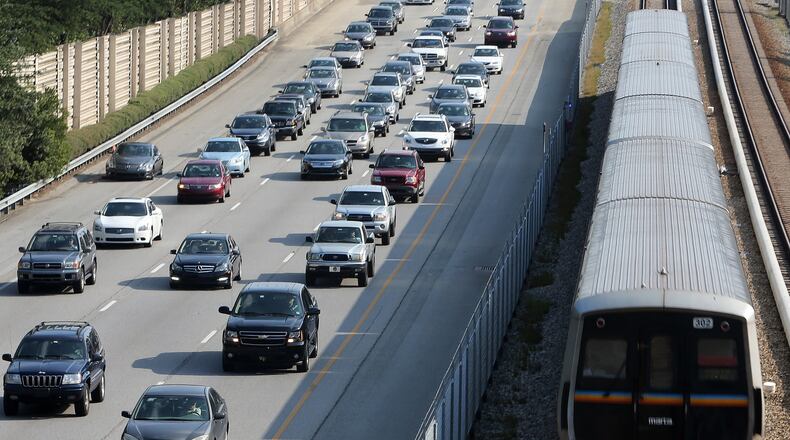Sales tax proceeds
Fulton County voters may consider a 1 percent sales tax for transportation next year. Preliminary estimates indicate the tax could raise $1.2 billion for the county and its 14 cities over five years. Here’s a breakdown of how that money would be distributed, based on the population of each city.
City Projected 2016 population Share of 1% tax
Unincorporated south Fulton 94,888 $114.3 million
Alpharetta 63,038 $75.9 million
Atlanta* 425,458 $512.4 million
Chattahoochee Hills 2,610 $3.1 million
College Park* 13,290 $16 million
East Point 35,488 $42.7 million
Fairburn 13,696 $16.5 million
Hapeville 6,669 $8 million
Johns Creek 83,102 $100.1 million
Mountain Park* 557 $670,869
Milton 36,662 $44.2 million
Palmetto* 4,437 $5.3 million
Roswell 94,089 $113.3 million
Sandy Springs 101,908 $122.7 million
Union City 20,427 $24.6 million
TOTAL 996,319 $1.2 billion
*Fulton County portion only
SOURCE: Fulton County
Fulton County elected officials may ask voters to tax themselves and spend $1.2 billion over five years to fix some of the region’s vexing transportation problems.
At a series of meetings in recent months, county commissioners, mayors and other officials from Fulton’s 14 cities have outlined plans for a November 2016 referendum on a new 1 percent sales tax to pay for road and transit improvements.
Though significant hurdles remain, those who attended a meeting last week signaled broad support for tackling Fulton's transportation problems – a top concern of metro Atlanta residents.
“I think we’re in a position to move together as a county, which we’ve never done before,” said Alpharetta Mayor David Belle Isle.
The General Assembly made the vote possible when it approved House Bill 170 earlier this year. The law boosts transportation spending in at least two ways. It's expected to generate nearly $1 billion annually for state transportation projects by raising gasoline taxes and other measures. It also allows counties to ask voters to approve sales taxes of up to 1 percent for local transportation projects.
The opportunity comes as Fulton County – long a poster child for political dysfunction – has taken steps to mend relations with its cities. County Commission Chairman John Eaves has convened a series of meetings with local mayors to discuss common concerns like economic development and transportation.
» LEARN MORE: View our interactive map to see how Fulton cities and unincorporated areas would benefit
Those conversations have evolved into tentative plans for a referendum on the transportation tax next year. Under the proposal, each jurisdiction would devise its own project list, though projects would have to meet criteria agreed upon by all participants.
Under a timeline unveiled last week, the county and cities would adopt those criteria by February. Project lists would be due in May and would be included in an intergovernmental agreement to be approved by each government in August.
Preliminary estimates indicate a full 1-percent sales tax could raise $1.2 billion over five years. If the money were distributed on the basis of each city’s population, the proceeds would range from $512.4 million for Atlanta to $670,869 for Mountain Park.
Other factors besides population, like miles of roads in each jurisdiction, could be considered. Any formula could produce winners and losers, and negotiations could prove difficult.
But the parties have a big incentive to find unanimity: Under the law, unless every government signs on, those who do participate can collect a tax of only .75 percent instead of a full 1 percent – cutting potential revenue sharply.
“The bottom line is, we rise or fall together,” Johns Creek Mayor Mike Bodker said at last week’s meeting.
Other factors also could influence the money available for the governments’ pet projects. Next year MARTA plans to ask the General Assembly for the ability to seek a half-penny sales tax to pay for an expansion into north Fulton and elsewhere. If the transit agency lays claim to half of the money from the local governments’ sales tax, it would dramatically reduce the amount of money available for road projects.
Assuming such issues can be resolved and the governments agree on a plan, voters would have the ultimate say. That may make it palatable to tax-averse politicians, especially in north Fulton.
For now, those involved sound cautiously optimistic voters will get that chance.
“This is going to be a great win for the county if we can continue to work together,” Fulton County’s Eaves said.
About the Author
Keep Reading
The Latest
Featured


